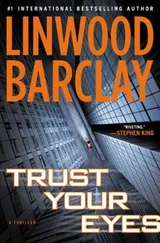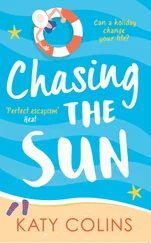“See you around.”
I went over to Lee and we stood there, Lee with her hand to her forehead like a visor, me squinting in the sun, arms folded, as Rodgers drove away.
“I need a shower,” I said without looking at her, without saying anything else.
I still smelled like sex. I must have stood in the tub for half an hour, the water running off the pink tile and my back. Soaping up seemed ceremonial. If you are now or have ever been a whore, do you have to go through a special cleansing ritual? For a brief, low moment, I wondered if the previous night could count as some kind of archetypal, Joseph Campbell initiation. But initiation into what? The world of adultery? Then I wondered if it was possible to create a scratch n’ sniff sticker of an after-sex scent, if that were a thing that people did — have sex, make a commemorative sticker — would I want one, as a kind of sense-memory aid to remind me of Rodgers? I could bury it in a drawer of socks. It would be there when I was old and Andy had died and our child had moved away. I would take it out then and think about a night long ago. I wouldn’t have a sticker for Andy. I wouldn’t need one. I would have so much of him. I would have a whole lifetime of him. Wouldn’t I?
While I was in the bathroom, Lee was busy making phone calls. First to Linda, in Los Angeles, who camouflaged any genuine reaction to the news that her daughter had talked to Flintwick with an effusive interest in the man. Oh, how is old Charlie? He didn’t do anything too unspeakable did he? But I don’t understand — how did you run into him? Oh, I see, but what were you doing up around there? Oh, honey, I wish you’d leave this alone. I just don’t think you’re going to find what you’re really looking for.
The second call Lee made had been to Bill Carnahan. If you weren’t on his preapproved list of callers, you had to talk your way past a team of receptionists and a good cop/bad cop pair of executive assistants before you were granted the opportunity to leave a message for the “massively busy” man himself. But Carnahan called Lee back within five minutes, while driving his Ferrari down I-95, headed to a property he owned on a bluff in Rhode Island. He would be there all weekend and hey, he had an idea. Wouldn’t you know those photographs he’d purchased from Charlie Flintwick were hanging in a widow’s walk he had converted into a carpeted strip of a room that he used for thinking and pacing. It was here that he waited “for his ships to come in.” It would be his pleasure to let Jesse Parrish’s daughter have a look at those prized possessions. Carnahan loved company, as did his wife.
“What do you think?” Lee asked me.
“I don’t know what I think.”
She was more or less ready to go, running on some kind of efficient drive that seemed so foreign to me just then. I was standing there in a thin, scratchy white towel that didn’t quite cover me, and I was at a loss. Even drying off seemed too complicated to do.
Lee went into the bathroom and came out with two more towels. She wrapped my wet hair up and then began to pat down my shoulders and my arms. I just watched her work on me. She was like a nurse. A blind, bandaged soldier would have fallen in love with her, with her touch, her manner, not knowing at all what she looked like.
“Okay. Stop,” I said. Turning away, finding my clothes.
“I’ll drive you back home,” she said. “And then go see Carnahan on my own.”
“No,” I said. I should have gone home, but I couldn’t. Not now, not yet. I couldn’t even call Andy. He’d texted me when I was in the shower.
Sorry I missed you last night. You OK?
I texted him back. The modern telegram, where you leave so much out, including your silence.
OK. Miss you. Love.
Then I got into the car with Lee.
NEITHER OF USspoke. Lee drove, and I said I needed to check in with work. So I emailed Frank, unnecessarily, and then searched “insane custody cases,” trying to figure out how to approach our Romola Dougherty story. Two years ago, on the night that a tornado tore through Mill River, Romola had given birth to a stillborn girl, and an orderly, obsessed with the Doughertys’ sharp-tongued daughter, switched the baby with another delivered at approximately the same time, presenting it to Romola as her own. Romola hadn’t made it to the hospital; she labored in the middle of a power outage at Pine Lawn, the town’s psychiatric facility. The baby’s biological mother, Peyton Sterling, had been committed to Pine Lawn during her seventh month of pregnancy, when she developed a rare psychomotor disorder that left her immobile and incommunicative. Now, Peyton had come out of that fog, remembered giving birth, and wanted her lost child back while Romola greived and raged. Romola and Peyton had been best friends; they had been troubled and cynical and fun together. They had been pregnant together, comparing notes and confiding hopes, until Peyton slipped out of this world. Romola had blossomed into a wonderful mother. Peyton’s mental condition was perfectly fine now but doctors said she could lapse into a vegetative state at any time. Who would you root for? What would become of their friendship?
I tried, but I couldn’t get lost in the characters. Out the window, the green rolling hills of western Massachusetts weren’t working for me either.
“What did I just do?” I said. “What am I going to say to Andy?”
“Do you have to say anything?” said Lee, as if picking up some place we’d left off. “You guys don’t have one of those arrangements where you’re allowed a certain number of, like, indiscretions?”
“We didn’t build infidelity into our relationship.”
“Right. Andy would never stray.”
Lee’s pronouncements on my husband’s nature made me feel proprietary toward him, even toward his capacity to be unfaithful. Her presumptuousness bothered me, as if deep down she knew Andy better than I did.
“Remember that night you met Rodgers? The night that Andy and I—”
I cut her off. “Yes.”
“Well. Andy wasn’t that into it. I mean, he was into it but he wasn’t — this is going to sound awful — he wasn’t as grateful — as I expected him to be?”
I didn’t want to hear this. But, perversely, I did.
“Yeah, well, Andy’s not an idiot,” I said. “He knew he was being used.” Could you extricate utility from friendship? It would be like trying to remove the egg from a soufflé.
“That’s what I mean. He let me use him and then he let me know he was letting me use him. In a kind way. All I’m saying is Andy is a kind person. He doesn’t hurt people on purpose.”
“But I do?”
“No, that’s not what I meant.”
I thought she might be about to say that she was the one who hurt people on purpose, but she didn’t say that.
“I know you. And I think I still know Andy. And I think you two are going to be fine.”
Reflexively, I wanted to ask her if she was so sure about that. But at heart, I wanted her to be right, wanted us to be fine. Part of me also wanted to believe she still knew me as no one else, not even Andy, did. When Andy and I were planning our wedding, Lee flew in from California early in the week. I imagined that she would steady me but also provide an escape during the tense days leading up to the event. She would save me from the surprisingly unrelenting demands of my mother. I had the thought that if Lee wasn’t there, the wedding wouldn’t be as worthwhile. That if she was there and impressed by it, it would mean more. The wedding, when I considered it in this light, didn’t have all that much to do with Andy. Kirsten, her tea lights, and her vintage dress, came to mind and instead of striking me as shallow and superficial, her approach to matrimony impressed itself upon me as a model. I confessed this to Lee.
Читать дальше












